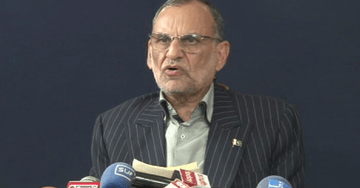ISLAMABAD: Being the high court of the federal capital, the Islamabad High Court cannot seek information of cases pending against a suspect in different parts of the country, IHC Chief Justice Aamer Farooq declared on Friday while disposing of a petition of PTI Senator Azam Swati.
The chief justice observed the court cannot issue direction to the government to get details of FIRs registered against Mr Swati in the Sindh and Balochistan provinces.
“Apparently, there seems to be other cases lodged against him on the basis of same occurrence i.e. social media tweets against armed forces of Pakistan. The other cases are in the provinces of Sindh and Balochistan,” the IHC order noted.
The petitioner was seeking details of cases registered against him beyond the IHC jurisdiction and also requested that the provincial police departments should be restrained from taking his custody.
Senator Swati, in his petition, requested the court to direct the interior ministry to provide information about the pending cases in the provinces of Sindh and Balochistan as well as those with the Federal Investigation Agency.
Babar Awan, counsel for the petitioner, contended before the court that information was required viz-a-viz the other cases, as it was a fundamental right of the petitioner to defend himself and avail appropriate remedies.
In support of his argument that the federation can issue directions to Sindh and Balochistan, the counsel placed reliance on Article 149 (directions to provinces in certain cases) and contended that liberal interpretation is to be made of all articles of the Constitution and entries in the Rules of Business, 1973.
Additional Attorney General Munawar Iqbal Duggal, however, argued there was per se no legal right available to the petitioner to seek such information, as the federal government was not obliged to obtain the required information for the petitioner in absence of any law in favour of or right of the petitioner to demand so from the centre.
Neither the provisions of the Constitution nor Rules of Business, 1973 conferred any right to any individual to seek the information, which the petitioner so wished, he added.
However, Mr Awan was of the opinion that Article 10-A of the Constitution conferred a right upon the petitioner to seek the information.
Chief Justice Farooq explained that in order to exercise jurisdiction in such matters, “there should exist a legal right in favour of the person who is seeking such relief.”
Discussing the case against Senator Swati, the court noted that the counsel for the petitioner in his arguments had referred to provisions (Entry No 18, Schedule-2, especially Serial No.18), which are about coordination of policy matters, relating to Rules of Business, 1973. Likewise, he also referred to Article 149, which empowers federal government to issue directions to the provinces, the high court observed.
Examination of the first provision shows that it does not confer any right in any citizen/individual to seek information regarding pendency of cases, the IHC noted.
Moreover, Article 149 and Rules of Business, 1973 does not entitle the petitioner in any manner to seek such information, the court declared, explaining that other cases against Mr Swati had been registered beyond the territorial jurisdiction of the IHC.
While noting that no writ can be issued against the provinces of Balochistan and Sindh, the IHC advised the PTI leader to seek remedy from the courts of competent jurisdiction.
The legal right claimed by the petitioner in the instant petition to seek information does not exist, as Article 149 of the Constitution and Rules of Business, 1973 are general, empowering the federal government to issue directions generally and not person specific.
The court ruled, “The petitioner may avail appropriate remedies before the provinces of Sindh or Balochistan” and made it clear that it could not issue any direction either to the interior ministry or the FIA to seek information related to cases against Mr Swati pending beyond IHC’s territorial jurisdiction.
Published in Dawn, December 17th, 2022












































